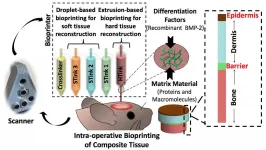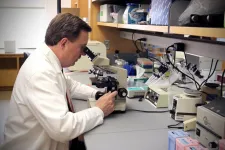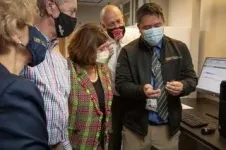A three-paper report published in The Lancet highlights that the current approach to miscarriage care must be improved, by providing more accurate diagnosis and appropriate investigations, improved treatments to prevent miscarriage, effective management methods that suit women's needs and preferences, and treatment from health-care professionals specifically trained in early pregnancy care. The authors also note that there is an urgent need to offer psychological support for affected women and their partners.
The Lancet Series on Miscarriage highlights that clinical practice for recurrent miscarriage is inconsistent and poorly organised worldwide. Women who have had recurrent miscarriages often need to attend many clinics in their search for a cause and remedy for miscarriage, as they are rarely able to access all tests and treatments in one clinic. This means they are treated by multiple health-care professionals, who frequently give conflicting advice due to variation in practice and guidelines, adding to women's distress as they try to understand their loss.
Co-lead author of the report, Professor Siobhan Quenby from the University of Warwick and the Deputy Director of Tommy's National Centre for Miscarriage Research, UK, says: "Many women have concerns over the unsympathetic care they receive following a miscarriage - with some not being offered any explanation, and the only advice they receive being to try again. This is not good enough, and we must ensure women are properly supported." [1]
She explains: "Although miscarriage is a one-time occurrence for most women, a significant portion of the population will require treatment and support. Yet silence around miscarriage remains not only for women who experience miscarriage but also among health care providers, policymakers, and research funders. We urge all countries to develop and provide more comprehensive miscarriage care services based on our recommendations, as well as improving research into miscarriage prevention, identifying women at high risk of physical and psychological after-effects, and screening for mental health issues after pregnancy loss." [1]
A Lancet editorial published alongside the report states: "For too long miscarriage has been minimised and often dismissed. The lack of medical progress should be shocking. Instead, there is a pervasive acceptance. Not all miscarriages could be avoided, but the insidious implication that miscarriage, like other women's reproductive health issues, including menstrual pain and menopause, should be managed with minimal medical intervention is ideological, not evidence based. This Series should catalyse a major focus on miscarriage for the medical research community, for service providers, and for policy makers. The era of telling women to "just try again" is over."
In addition to insufficient care and support, there is debate over the definition of recurrent miscarriage [2], its causes, and its effects. The new report aims to create consensus by summarising the best available evidence to provide up-to-date estimates of the prevalence and risk factors for miscarriage, the physical, psychological, and economic costs of early pregnancy loss, as well as providing recommendations to improve care for miscarriage. The report is published alongside an editorial by The Lancet (available in notes to editors), and is an effort from 31 international authors whose expertise spans miscarriage treatment and care, epidemiology, health economics, laboratory science, clinical trials, and patient advocacy.
The global scale of miscarriage New estimates in the report suggest that approximately 23 million miscarriages occur every year globally (equivalent to 15% of all pregnancies annually). However, the authors say that actual number of cases will be considerably higher than this estimate as many miscarriages are managed at home and go unreported or unrecognized. They estimate that on average one in 10 women (11%) have experienced a miscarriage in their lifetime, but recurrent miscarriages are less common (2% of women have experienced two miscarriages, and less than 1% have experienced three or more miscarriages).
An analysis in the report confirms that chromosomal anomalies in the foetus, maternal age, previous miscarriages, paternal age of 40 years or more, very low or high body mass index, Black ethnicity, smoking, alcohol, persistent stress, working night shifts, exposure to air pollution, and exposure to pesticides are associated with an increased risk in miscarriage (see table S5 in paper 1 appendix).
Impact of miscarriage In a literature review, the authors found that miscarriages can be associated with obstetric complications in future pregnancies, and with immediate and future health problems for women (see table S6 in paper 1 appendix).
"Recurrent miscarriage is a devastating experience for most women, but the mental health impact is rarely acknowledged or addressed in medical care," says Professor Arri Coomarasamy, co-lead author of the report, from the University of Birmingham and Director of Tommy's National Centre for Miscarriage Research, UK. "Women can experience trauma and bereavement, which may have no obvious signs and can go unrecognised. In our study we found that miscarriage was associated with anxiety, depression, and post-traumatic stress disorder - with approximately 20% of women experiencing PTSD nine months after miscarriage. As a result, we recommend screening and offering mental health support to every woman who needs it. Services should prioritise both physical and psychological support." [1]
The report also includes a literature review of the costs of miscarriage on individuals, health-care systems, and society. It finds that direct health service costs for treating a miscarriage range from £300 to £2,240 (including a range of treatments), work absences due to a miscarriage cost around £430, and that the costs associated with lower productivity when women return to work after a miscarriage are also around £430. Applying these estimates to the prevalence of miscarriage in England, the authors estimate that the economic cost of miscarriages in England is £471 million per year. However, this accounts for the initial treatment period and not the long-term effects.
Improving miscarriage care To appropriately manage miscarriages, the authors call for accurate diagnosis through effective and high-quality ultrasound services, and for women to be offered guidance on the range of ways for their miscarriage to be managed [3] so they can make an informed decision that suits their needs. The authors say that miscarriage care should ideally be given in specialist early pregnancy units by specially trained nurses and doctors, and call for global investment in such care.
For recurrent miscarriage, the authors created recommendations (based on existing literature and guidelines, and a UK-wide consensus conference that was held in December 2019) where the level of care increases in line with the number of miscarriages. These recommendations are focussed on the UK, but could still benefit women elsewhere, while ensuring appropriate approaches are provided based on available resources and local health systems. They also outline a set of investigations and treatments [4], which they believe should be made available globally.
After a first miscarriage, the authors recommend that women be provided with information about miscarriage and physical and mental health needs, as well as health guidance to support future pregnancy. This could be via patient groups, online self-help, lifestyle services, and mental health screening.
Following a second miscarriage, women should be offered an appointment at a miscarriage clinic for full blood count and thyroid function tests, as well as a discussion of their risk factors. If any test results are abnormal or women have chronic physical or mental health problems, they should be referred for specialist care. In addition, in subsequent pregnancies, women who have had two miscarriages should be offered extra support and early scans for reassurance.
After three miscarriages, additional tests and treatments should be offered under the care of a medical consultant. Genetic testing of pregnancy tissue should be offered, as well as pelvic ultrasound and, if necessary, parental genetic testing. Women should be screened and offered care for mental health issues, and screened for obstetric risks in future pregnancies.
Professor Quenby says: "Our recommended model of care ensures that all miscarriages receive care, and that extra support is given to women experiencing recurrent miscarriages. We recommend caregivers neither normalise nor over-medicalise recurrent miscarriage care, but provide care suited to women's needs and preferences. We have outlined a minimum set of investigations and treatments that should be offered to women who have had repeated miscarriages, and recommend that health-care professionals and policymakers make these universally available." [1]
Miscarriage care around the world and a lack of international data Professor Chandrika N Wijeyaratne, University of Colombo, Sri Lanka, says: "Women - and sometimes their partners - who do not have children face discrimination, stigma, and ostracism in many cultures worldwide, but miscarriage prevention remains a low public health priority in many low- and middle-income countries, where there are many competing health care priorities and services for women can be especially limited. There needs to be a minimum service available globally for women with recurrent miscarriage, and in low- and middle-income countries this service should include tests to check for diabetes, anaemia, thyroid abnormalities, and antiphospholipid syndrome when indicated, with appropriate treatment based on the results. There also needs to be a focus on providing pre-pregnancy counselling and psychological support to women with repeated miscarriages. This will require investment in early pregnancy care in low- and middle-income countries, and we recommend increasing provision of medication and equipment, training in scanning and surgical procedures, and creating dedicated early pregnancy units to ensure high-quality care. Awareness-raising programmes to encourage women to seek care is also needed." [1]
The authors say that although most miscarriages happen in low-income countries, most of the available research is from high-income settings, and there is an evidence gap on miscarriage prevalence, consequences, and costs in low- and middle-income countries that must be addressed. The authors stress the need for better data collection, with few countries reporting an annual miscarriage rate, which makes international comparisons difficult.
"We recommend that early pregnancy services document and report miscarriages to a national registry, and national registries should report annual miscarriage data, as seen with the reporting of stillbirth. Such data will facilitate efficient organisation of care, better allocation of scarce resources, research, and international comparisons," says Professor Coomarasamy. [1]
"The recommendations in this Series are based on the best available evidence. However, there are limitations in the evidence around miscarriage, particularly in the quality of some clinical trials, so we have also had to rely on expert opinion in places. This highlights the need to improve and increase research into miscarriage. To improve understanding and find and test new treatments, we need new clinical trials, and we need dedicated research centres with expertise in genetics, developmental and reproductive biology, and data science." [1]
INFORMATION:
NOTES TO EDITORS
The Series received no direct funding. However, the Series was led and co-ordinated by the Tommy's National Centre for Miscarriage Research, which is supported by Tommy's Charity. A full list of authors and their institutes is available in the paper.
If you are reporting on this study, please consider including a link to information and support for your readers.
UK: Tommy's - midwife@tommys.org / 0800 014 7800 (Monday to Friday, 9am to 5pm) / https://www.tommys.org/
France; Agapa - 01 40 45 06 36 / contact@agapa.fr / https://association-agapa.fr/
Australia: SANDS - 1300 072 637 / https://www.sands.org.au/
Red Nose - 1300 308 307 / support@rednose.com.au / https://rednosegriefandloss.org.au/support
Pink Elephants - https://www.pinkelephants.org.au/page/75/peer-support-live-chat / https://www.pinkelephants.org.au/page/66/all-the-support
USA: March of Dimes - https://www.marchofdimes.org/index.aspx
Share - 1-800-821-6819 / https://nationalshare.org/online-support/
Miscarriage Matters - https://www.mymiscarriagematters.org/services
The Lancet Series on Miscarriage is a collection of three papers examining global evidence on the epidemiological, physical, psychological, and economic costs of these early pregnancy losses, as well as making recommendations for best practice care and support based on this review. Tommy's National Centre for Miscarriage Research led an international group of authors in the Series, and their findings underpin the calls for UK policy change in Tommy's new Miscarriage Matters campaign.
The labels have been added to this press release as part of a project run by the Academy of Medical Sciences seeking to improve the communication of evidence. For more information, please see: http://www.sciencemediacentre.org/wp-content/uploads/2018/01/AMS-press-release-labelling-system-GUIDANCE.pdf if you have any questions or feedback, please contact The Lancet press office pressoffice@lancet.com
[1] Quote direct from author and cannot be found in the text of the Article.
[2] The definition of miscarriage varies amongst countries and international organisations, based on different gestational ages of the foetus, whether pregnancy was confirmed by a urine test (for β-human chorionic gonadotropin) or by ultrasound scan, and, for recurrent miscarriage, if the pregnancy losses are consecutive or if the woman has livebirths in between miscarriages.
[3] Miscarriage management options are either expectant (ie, without medical intervention), medical (misoprostol, with or without mifepristone), or surgical (suction aspiration, or suction aspiration plus cervical preparation).
[4] The essential investigations include measurements of lupus anticoagulant, anticardiolipin antibodies, thyroid function, and a transvaginal pelvic ultrasound scan. Chromosome analysis of pregnancy tissue can be done for explanatory purposes. Selected women can benefit from parental karyotyping.
The key treatments to consider are first trimester progesterone administration, levothyroxine in women with subclinical hypothyroidism, and the combination of aspirin and heparin in women with antiphospholipid antibodies. They note that the evidence for these treatments is of moderate and low quality, and there is no high-quality evidence for any treatments to prevent recurrent miscarriage.
IF YOU WISH TO PROVIDE A LINK FOR YOUR READERS, PLEASE USE THE FOLLOWING, WHICH WILL GO LIVE AT THE TIME THE EMBARGO LIFTS: http://www.thelancet.com/series/miscarriage
Peer-reviewed / Review and opinion





